
The terms introverted and extraverted are most commonly used to describe a person either being socially outgoing or withdrawn. Usually, extraverts are seen as social butterflies while introverts are seen as the awkward wall flowers or book worms.
Most people aren’t aware that extraversion/introversion has a genetic component. Studies of identical twins reveals that there is a difference in brain tissue, with introverts having higher levels of activity than extraverts. With all of this internal activity already occurring in an introvert, it makes sense that prolonged periods of social activity would be overstimulating and can lead to an introverted person becoming more withdrawn and fatigued, especially if the interaction is long in duration and/or intensity. It’s as though “batteries are included” and they require down time to recharge for further use.
Extraverts, with their less active brain tissue, seem to be energized by social interaction. Think of a solar powered machine that functions best when outside. Extraverts typically do not need much down time, and could even be uncomfortable being alone for too long.
Relationships
Whether you're an extravert or an introvert, it's important to recognize that we are all different and must understand our own needs as well as the needs of others in maintaining adequate energy levels.
Extraverts may not understand their introvert partner's need to have some time alone. Introverts may not understand their extravert partner's need to socialize and interact with others. Whether this is a best friend, significant other, family member, co-worker or otherwise - it’s very important to be clear that these behaviors are due to different energetic needs and it isn’t to be taken personally.
Introvert/introvert relationships do well in that the partners have similar needs for down time. In these relationships, however, partners may find that they hold back in communicating with one another, potentially leading to distancing. Extravert/extravert relationships share in the enjoyment of outside or social activities. In these relationships, because extraverts enjoy communicating, there could be some competition for attention and having the floor. Basic communication skills, expressing needs to each other and compromising helps avoid unnecessary conflict or distance in the relationship.
Personally, I'm an introvert. Many have mistaken me for an extravert due to my outgoing nature at times. What I have learned about myself is though I may enjoy connecting with others very much, I need time and space to recharge by "batteries". If I don't take care of myself, I will have to shut down and withdraw into my shell. And here I go.
Shannon

 RSS Feed
RSS Feed